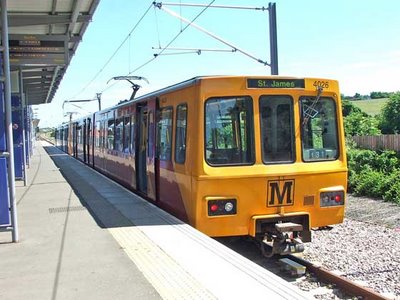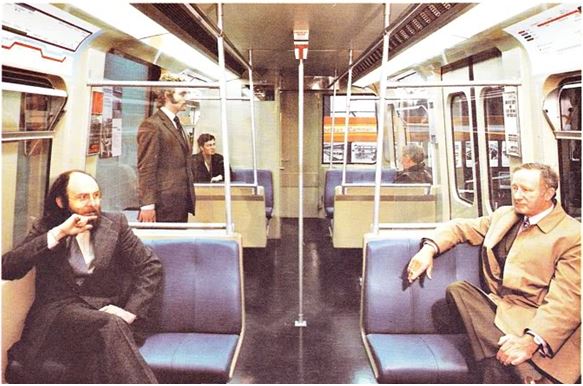Xchange #5 – Tyne & Wear Metro – Sat 20 July 2013
JOIN US for a StepUp! creative Xchange Afternoon of exploration and peer-to-peer networking on and around the Tyne and Wear Metro circuit on Saturday 20 July, 1pm-5.30pm.
StepUp! is proud to partner with NEXUS and Empty Shop to welcome artists of ALL disciplines and backgrounds to spend an afternoon in an alternative universe. We invite you to join us to transform, explore and rethink everything you thought you knew about the daily commute. Transform the mundane and banal with a sense of wonder; reconsider the view; look beyond what your eyes have previously presented to your brain and rethink all the journey’s you’ve ever taken. Public transport will never be the same again…welcome to METRO TEST CENTRE.
Context of this Xchange setting:
In 1974 two prototype passenger cars had begun trials at the purpose built Metro Test Centre (see Appendix 1 at bottom of page) at Middle Engine Lane, Wallsend (located on the North Shields/Wallsend border where the George Stephenson Museum now sits. This museum is home to a collection of locomotives from the early days of the railways (the 1826 Billy)). The Test Cente included 2.4km of track with a tunnel section, a car shed and control room, plus other support and training facilities for officials, potential investors/staff and the general public. They could see how this new “Metro” initiative could lead the country in public transport innovation, commuting people from coast to moor – city to suburb for work and play. For this Xchange event we want creative participants to come fresh to this Metro based Xchange session, like those who encountered the Test Centre almost 40 years ago might have.
StepUp! and Empty Shop will take you on a sublimely-mundane journey beginning in fact, reality and the present, Newcastle Central Station’s Metro terminal (at the ticket machines). Participants will then descend into the subterranean tunnels of the Metro where we will firstly be acquainted with one another through a loosely facilitated networking activity, before being split into two groups to make two separate activity-based journeys for the first half of the session (group 1 with StepUp!’s Tim Rubidge and Steven Walker; group 2 with Empty Shop’s Nick Malyan and Carlo Viglianisi). The two groups will then reconnect on the North/South Shields Metro ferry to make the second half of the journey as one whole group to Tynemouth for further explorations. The final commute will be from Tynemouth around 5pm back to where the session began, Newcastle Central Station.
Image: North/South Shields Metro Ferry
Social note: When the session is over there is an option for a more relaxed social at a pub nearby Central Station for those wanting to join us.
Attendees will receive more details, timings and resources once you have booked onto the session (please note: session is limited to 20 places).
Booking: Email Steven Walker, StepUp! Manager, via: xchange.coordinator@gmail.com with subject title: ‘Attending 20 July, Metro Xchange′. EASY.
Costs: £6.50.
Attendance to our events is free, however for this session there is the cost of an ‘all-zone Metrosaver ticket’ at £4.40 (valid on Metro, the Shields Ferry and the connecting 333 bus service). Plus approx £2 for a bag of chips at Marshall’s Fish & Chip Shop (or other snacks) towards the end of the session in Tynemouth.
Who might like to attend?:
ALL creatives and ALL artists inclusive of all art forms and levels of experience. Equally welcome are studio groups, arts professionals, and interested individuals or organisations wanting to explore practice through activity-led peer-to-peer networking in intriguing, weird and wonderful sites, spaces and contexts across our glorious region. We wish to make our events suitable for a truly diverse audience. Our definition of diversity encompasses responding to issues around race, ethnicity, faith, disability, age, gender, sexuality, class and economic disadvantage, and any other social and institutional barriers that prevent people from participating in and enjoying the arts; mirroring the Creative Case for Diversity.
About StepUp! Xchange events:
StepUp! Xchange events are for people from any art-form and background. They are shaped to use the nature of the place and situation to inspire discussion, share of practice, theme event activities and develop peer group support. They are facilitated by StepUp! and collaboration partners experienced in bringing people together with a good sense of both creative interest, participation and fun.
About Empty Shop:
Empty Shop CIC is a non profit arts organisation in the North East of England and based in Durham City. We formed in 2008 with the idea to provide a much needed and accessible platform for artists of all levels and backgrounds to produce exhibit and engage with art. As the organisation has grown we have developed into well rounded permanent fixture in the North East art scene.
Today Empty Shop still provides those opportunities and resources that were so few and important back then but our reach now also expands into a whole cross section of areas and expertise.
Empty Shop started in 2008 and chooses to be completely unfunded and fully independent.
Where is Empty Shop?
Empty Shop HQ is in Durham city centre however we also utilise other venues and public spaces temporarily to provide accessible, temporary galleries and site specific events. More info here
About the Tyne and Wear Metro (Setting the scene):
- When work started on Metro in 1974 it became Britain’s largest urban transport project of the 20th Century, and stood out as one of the greatest achievements of the region’s rich industrial heritage.
- Built at a time of financial crisis and high unemployment it seems a miracle that it ever got up and running. But against all the odds the project was seen through to completion and was opened in the summer of 1980 by Her Majesty The Queen, to a fanfare of critical acclaim.
- Metro was an instant success story and became part of everyday life on Tyneside, and on Wearside in 2002.
- The beginnings of Metro date back to 1971 and a document called ‘The Transport Plan for the 1980s’. This came up with a rail solution to give commuters a modern, fast and reliable route into the heart of Newcastle – Metro was born.
- It was felt that the introduction of a modern urban railway using tunnels to reach the most popular central destinations would provide the backbone of a fully integrated public transport system, in the short term for the benefit of the majority without access to cars, and longer term as an attractive alternative to the car.
- The financial viability of Metro was confirmed following extensive lobbying by the Tyne and Wear PTA, local authorities and politicians throughout the region by December 1972. The Government agreed to a 75 percent grant towards the cost of building the system.
- The construction of Metro began in 1974 and less than four years later after it came into existence, the Tyne and Wear PTE found itself responsible for developing the largest urban transportation project in Britain.
- By 1975 two prototype passenger cars had begun trials at a purpose built Metro test centre, which included 2.4km of track with a tunnel section, car shed and control room, plus other support and training facilities.
- Tunnels were driven beneath the busy streets of Newcastle and new viaducts built to span the Tyne and Ouseburn valleys. Ground conditions under Newcastle were favourable for tunnelling.
- Beneath Gateshead the ground was made of alternate layers of sandstone and coal seams that had first been worked in the 14th century, demanding a different form of tunnel construction. The engineering of these underground sections and the central area stations entailed an extensive series of public utility diversions, as well as measures to avoid damaging impacts on the architectural heritage of the centre of Newcastle.
- The construction programme met with several delays. Partly because of differences between the PTE, British Rail, and the railway unions about who should own and operate the system, and partly as a result of the financial crisis of 1976 when the Government imposed a freeze on major capital projects in the public sector.
- By 1977 these problems had been resolved, and Tyne and Wear County Council (formed in1974 after local government reorganisation) agreed to commit to the project almost all its capital investment in transport so as to ensure completion of the system.
- When Metro opened to the public in August 1980 it set new standards for urban transport which has since been copied across the globe. It was Britain’s first light rapid transit system and the heart of an integrated transport network.
- From its inception Metro was a strictly no smoking zone and was the first railway in the country to be truly wheelchair compatible. By the mid 1990s Metro pioneered mobile phone connectivity in its tunnels and was the first railway in Britain to play classical music at stations to improve the passenger waiting environment.
- The system was progressively opened in phases through to 1984 when the full 55km of the original network became operational. In its first year of full operation there were over 60 million passenger journeys, confirming Metro’s potential as the mainstay of a fully integrated public transport system.
- The local rail network was privatised in 1996, however, throughout this period, Tyne and Wear PTE, Nexus as it is now called, kept responsibility for the operation of Metro.
Image: 1974 staged passangers example in the mock-up carriage interior
Previous Xchange participant testimonials:
“Spending time at Cambois beach gave me the time and the space
to ‘breath’ and take stock creatively. It gave me the opportunity to reflect on my own work
by talking to other people and sharing experiences. Being a good 40 mins drive from my home in the inner citymeant I could ‘step outside’ my life for half a day. I feel this was beneficial to me in allowing me
to reflect with more clarity. Spending the afternoon with other creative people from other disciplines
gave me the opportunity to think about other people’s art forms”
- Bethany Bethany peacock-Fabian, Dance Professional
“It was great to be invited, and fascinating to gain an insight into people’s artistic processes!”
- Guy Mankowski, Author
“That was such a great event, absolutely inspirational and life affirming.”
– Cindy Robinson-Begg, Artist
Big thanks to the Metro Xchange partners:
Nexus/Metro & Empty Shop:
StepUp! is made possible by support from Arts Council England and is produced by Intercultural Arts








You must be logged in to post a comment.